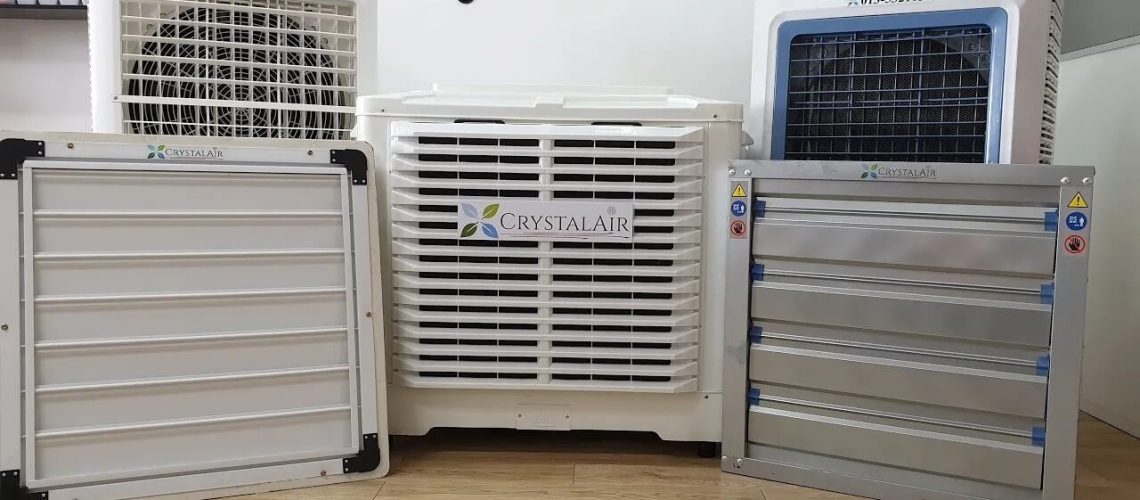Choosing the right air cooler can make a significant difference in maintaining comfort in your home or business. This guide will help you understand how air coolers work, their benefits, the different types available, and how to select the best one for your needs.
How Does an Air Cooler Work?
Air coolers, also known as evaporative air coolers, operate on a simple yet effective principle. These devices draw warm air from the environment and pass it through water-saturated cooling pads. The water evaporates, absorbing heat from the air and significantly lowering the air temperature. A fan then circulates this cooled air throughout the room, providing a refreshing breeze.
This process is energy-efficient and environmentally friendly. Unlike traditional air conditioners, evaporative air coolers do not rely on refrigerants, which can be harmful to the environment. Instead, they use water as the cooling medium, making them a sustainable choice for cooling needs.
Benefits of Using Air Coolers
1. Improved Air Quality
Air coolers help improve air quality by adding moisture to the air and filtering out dust and allergens. This can be particularly beneficial in dry climates where air conditioning can further reduce humidity levels, causing discomfort and health issues.
2. Cost-Effective Cooling
Air coolers are generally more affordable than traditional air conditioning systems, both in terms of initial purchase and operating costs. They consume significantly less electricity, leading to lower energy bills.
3. Environmentally Friendly
Evaporative air coolers use water for cooling, which avoids the use of harmful refrigerants. This makes them a greener option, reducing your carbon footprint.
4. Easy Installation and Maintenance
Most air coolers, including portable air coolers, are easy to install and require minimal maintenance. Regular cleaning of the cooling pads and water tank ensures optimal performance and longevity.
Types of Air Coolers
1. Portable Air Coolers
Portable air coolers are compact and easy to move from room to room. They are ideal for cooling small spaces or providing additional cooling support in larger areas. Their portability allows for flexible use in different parts of your home or business premises.
2. Window Air Coolers
Window air coolers are installed in a window or wall opening, drawing air from outside. They are more powerful than portable units and can cool larger spaces effectively. This type of air cooler is suitable for rooms with permanent cooling needs.
3. Desert Air Coolers
Desert air coolers are designed for hot and dry climates. They have large water tanks and powerful fans to deliver maximum cooling. These coolers are ideal for large spaces such as living rooms, halls, and commercial establishments.
4. Personal Air Coolers
Personal air coolers are small, compact devices designed for individual use. They are perfect for personal spaces like workstations, bedrooms, or small offices. These coolers provide focused cooling and are energy-efficient.
How to Select the Best Air Cooler for Your Home or Business Premises
1. Assess Your Cooling Needs
Consider the size of the area that needs cooling. For small rooms, a portable air cooler may be suitable, while larger spaces might require a window or desert air cooler. Evaluate the specific requirements of your home or business premises to determine the appropriate cooling capacity.
2. Consider the Climate
In regions with high humidity, evaporative air coolers may not be as effective, as they rely on the evaporation process. However, in dry climates, these coolers can provide excellent cooling and added humidity. For instance, an evaporative air cooler in Malaysia might be more suitable for areas with lower humidity levels.
3. Look for Energy Efficiency
Check the energy efficiency ratings of different air coolers. Opting for an energy-efficient model will help reduce electricity consumption and lower operational costs. Look for features such as adjustable fan speeds and programmable timers to maximize energy savings.
4. Evaluate Noise Levels
Some air coolers can be noisy, especially at higher fan speeds. If noise is a concern, look for models designed to operate quietly. Reading customer reviews and product specifications can provide insights into the noise levels of different units.
5. Check for Additional Features
Modern air coolers come with various additional features that enhance convenience and performance. Look for features like remote control operation, digital display, multiple fan speeds, and air purification filters. These features can make using the air cooler more convenient and efficient.
6. Budget Considerations
Determine your budget and compare different models within that range. While it is essential to choose an air cooler that meets your needs, it is also important to ensure it fits within your budget. Remember that investing in a slightly more expensive, energy-efficient model can lead to long-term savings on electricity bills.
7. Maintenance Requirements
Consider the maintenance requirements of the air cooler. Some models may need more frequent cleaning or replacement of cooling pads. Choose a model with manageable maintenance needs to ensure it remains efficient and durable.
All in All
Selecting the right air cooler involves understanding how these devices work, their benefits, and knowing the different types available. Assessing your specific cooling needs, considering the climate, and evaluating energy efficiency, noise levels, and additional features will guide you in making an informed decision.
Regardless of whether you choose a portable air cooler for flexibility or a stronger evaporative air cooler for larger spaces, the right choice will ensure a comfortable and pleasant environment in your home or business premises.


